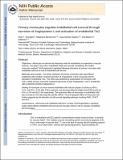| dc.contributor.author | Schubert, Shai Y. | |
| dc.contributor.author | Benarroch, Alejandro | |
| dc.contributor.author | Monter-Solans, Juan | |
| dc.contributor.author | Edelman, Elazer R. | |
| dc.date.accessioned | 2012-12-11T15:10:46Z | |
| dc.date.available | 2012-12-11T15:10:46Z | |
| dc.date.issued | 2011-01 | |
| dc.date.submitted | 2010-02 | |
| dc.identifier.issn | 1079-5642 | |
| dc.identifier.issn | 1524-4636 | |
| dc.identifier.uri | http://hdl.handle.net/1721.1/75366 | |
| dc.description.abstract | Objective—Monocyte recruitment and interaction with the endothelium is imperative to vascular recovery. Tie2 plays a key role in endothelial health and vascular remodeling. We studied monocyte-mediated Tie2/angiopoietin signaling following interaction of primary monocytes with endothelial cells and its role in endothelial cell survival.
Methods and Results—The direct interaction of primary monocytes with subconfluent endothelial cells resulted in transient secretion of angiopoietin-1 from monocytes and the activation of endothelial Tie2. This effect was abolished by preactivation of monocytes with tumor necrosis factor-α. Although primary monocytes contained high levels of both angiopoietin 1 and 2, endothelial cells contained primarily angiopoietin 2. Seeding of monocytes on serum-starved endothelial cells reduced caspase-3 activity by 46±5.1%, and 52±5.8% after tumor necrosis factor-α treatment and decreased detected single-stranded DNA levels by 41±4.2% and 40±3.5%, respectively. This protective effect of monocytes on endothelial cells was reversed by Tie2 silencing with specific short interfering RNA. The antiapoptotic effect of monocytes was further supported by the activation of cell survival signaling pathways involving phosphatidylinositol 3-kinase, STAT3, and AKT.
Conclusion—Monocytes and endothelial cells form a unique Tie2/angiopoietin-1 signaling system that affects endothelial cell survival and may play critical a role in vascular remodeling and homeostasis. | en_US |
| dc.language.iso | en_US | |
| dc.publisher | American Heart Association | en_US |
| dc.relation.isversionof | http://dx.doi.org/10.1161/ATVBAHA.110.218255 | en_US |
| dc.rights | Creative Commons Attribution-Noncommercial-Share Alike 3.0 | en_US |
| dc.rights.uri | http://creativecommons.org/licenses/by-nc-sa/3.0/ | en_US |
| dc.source | PMC | en_US |
| dc.title | Primary monocytes regulate endothelial cell survival through secretion of Angiopoietin-1 and activation of endothelial Tie2 | en_US |
| dc.type | Article | en_US |
| dc.identifier.citation | Schubert, S. Y. et al. “Primary Monocytes Regulate Endothelial Cell Survival Through Secretion of Angiopoietin-1 and Activation of Endothelial Tie2.” Arteriosclerosis, Thrombosis, and Vascular Biology 31.4 (2011): 870–875. Web. | en_US |
| dc.contributor.department | Harvard University--MIT Division of Health Sciences and Technology | en_US |
| dc.contributor.mitauthor | Schubert, Shai Y. | |
| dc.contributor.mitauthor | Edelman, Elazer R. | |
| dc.relation.journal | Arteriosclerosis, Thrombosis, and Vascular Biology | en_US |
| dc.eprint.version | Author's final manuscript | en_US |
| dc.type.uri | http://purl.org/eprint/type/JournalArticle | en_US |
| eprint.status | http://purl.org/eprint/status/PeerReviewed | en_US |
| dspace.orderedauthors | Schubert, S. Y.; Benarroch, A.; Monter-Solans, J.; Edelman, E. R. | en |
| dc.identifier.orcid | https://orcid.org/0000-0002-7832-7156 | |
| mit.license | OPEN_ACCESS_POLICY | en_US |
| mit.metadata.status | Complete | |
